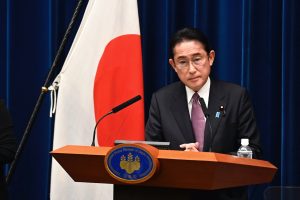Late last month brought two news items that could hardly be called positives for China-Japan relations. First, a Japanese pharmaceutical executive was detained in China on suspicion of espionage. And second, when China’s Ambassador to Japan Kong Xuanyou returned to China at the end of February, Japanese Prime Minister Kishida Fumio did not agree to a farewell meeting, breaking with a long-held custom. It is a complex situation, but a few observations can be made.
To put it simply, Japan, like China, is no longer pursuing a path of simply improving relations. Rather, it has shifted to an approach of looking for opportunities to better ties under a broader policy of containment. For as long as the policy was focused on improving relations, conventional Japanese diplomacy with China avoided friction whenever possible. But while Beijing has shown an openness to better relations with Japan, the People’s Liberation Army and the China Coast Guard are active around the Senkaku Islands, which are administered by Japan but claimed by Beijing, and China continues to detain Japanese nationals. Hence Japan’s new containment emphasis.
In fact, the positive diplomacy has been striking. On February 2, Japanese Foreign Minister Hayashi Yoshimasa held a telephone meeting with Chinese Foreign Minister Qin Gang. Five days later, on February 7, Japanese Ambassador to China Tarumi Hideo met with Vice Foreign Minister Sun Weidong, and then on February 21, Sun visited Japan and held the 28th regular consultation between the diplomatic authorities of Japan and China in Tokyo, together with Yamada Shigeo, Japan’s senior deputy minister for foreign affairs. Next, on March 7, the Chinese foreign minister presented conditions for fostering a “China-Japan relationship for the new era” at a press conference. China’s concerns were roughly focused on Taiwan and the issue of treated water at Fukushima nuclear power plant. In talks with China, the Japanese side has brought up security matters, including China’s military activities near Japan, and has sought a resolution to detentions of Japanese nationals.
Nonetheless, the ground for improving relations between Japan and China has been developing, and a meeting of foreign ministers was only a matter of time. It was difficult for China’s newly appointed foreign minister, Qin Gang, to visit Japan, but Japan’s Foreign Minister Hayashi visited China on April 1 and 2. This was good news for Qin, who has signaled that he will abandon China’s “wolf warrior” diplomacy.
As for the Kishida administration, the business community and other groups in Japan have been strongly pushing for better relations with China. Moreover, this is a significant year, being the 45th anniversary of the Treaty of Peace and Friendship between Japan and China. However, Kishida wants to dispel concerns that he is soft on China. Given that relations with South Korea are nearly back on track, Japan’s agenda likely has China as the next target for improved relations.
So why break with custom and refuse to meet with the Chinese ambassador at the end of his term? An “application” from the Chinese embassy was made in January and a response would have been given in February, so the detention of a Japanese national was basically irrelevant. Some have speculated that Kishida’s decision was in protest at Chinese activities around the Senkaku Islands, but these are nothing new. There have also been media reports that the government took into account Japanese public opinion on China. It is true that the Kishida administration is particularly sensitive to public opinion, but the Japanese public has maintained an 85 percent negative view on China for some time. There has been no rapid downturn in recent months.
Perhaps Kishida’s intention was to counter claims that his government is soft on China, particularly ahead of Hayashi’s visit to China.
There is, however, another likely reason why the prime minister’s official residence declined to meet with the departing Chinese ambassador. Simply put, it was a matter of reciprocity. Japanese ambassadors do not get to meet with China’s foreign minister, often meeting with the vice-minister instead. Aside from the presentation of credentials upon arrival as ambassador, it is extremely rare to meet with the president or premier when leaving a country. With that in mind, holding a “farewell meeting” at the prime minister’s official residence when a Chinese ambassador departs would not be consistent with the principle of reciprocity.
In any case, Japan now has an approach of improving relations with China while at the same time seeking to contain it. Moreover, at the meeting of foreign ministers, Hayashi took the position that both sides should speak frankly, while creating a framework for avoiding worst-case scenarios and exploring ways to work together in different areas. It is likely that Kishida’s administration will be looking to establish this as the new blueprint for relations with China.

































